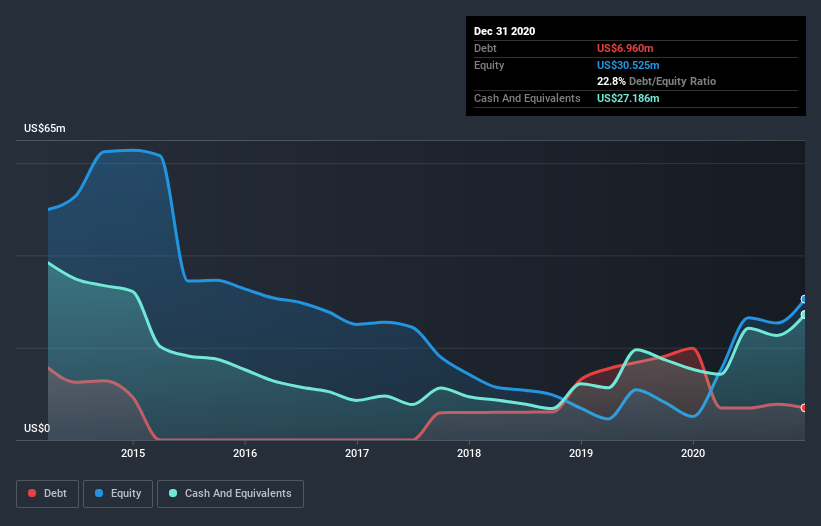Is iCAD (NASDAQ:ICAD) Using Too Much Debt?
The external fund manager backed by Berkshire Hathaway's Charlie Munger, Li Lu, makes no bones about it when he says 'The biggest investment risk is not the volatility of prices, but whether you will suffer a permanent loss of capital.' It's only natural to consider a company's balance sheet when you examine how risky it is, since debt is often involved when a business collapses. We can see that iCAD, Inc. (NASDAQ:ICAD) does use debt in its business. But should shareholders be worried about its use of debt?
When Is Debt A Problem?
Debt and other liabilities become risky for a business when it cannot easily fulfill those obligations, either with free cash flow or by raising capital at an attractive price. In the worst case scenario, a company can go bankrupt if it cannot pay its creditors. However, a more frequent (but still costly) occurrence is where a company must issue shares at bargain-basement prices, permanently diluting shareholders, just to shore up its balance sheet. Of course, debt can be an important tool in businesses, particularly capital heavy businesses. When we think about a company's use of debt, we first look at cash and debt together.
See our latest analysis for iCAD
What Is iCAD's Net Debt?
You can click the graphic below for the historical numbers, but it shows that iCAD had US$6.96m of debt in December 2020, down from US$19.9m, one year before. However, its balance sheet shows it holds US$27.2m in cash, so it actually has US$20.2m net cash.
How Healthy Is iCAD's Balance Sheet?
The latest balance sheet data shows that iCAD had liabilities of US$16.8m due within a year, and liabilities of US$8.31m falling due after that. Offsetting these obligations, it had cash of US$27.2m as well as receivables valued at US$10.0m due within 12 months. So it can boast US$12.2m more liquid assets than total liabilities.
This short term liquidity is a sign that iCAD could probably pay off its debt with ease, as its balance sheet is far from stretched. Simply put, the fact that iCAD has more cash than debt is arguably a good indication that it can manage its debt safely. There's no doubt that we learn most about debt from the balance sheet. But it is future earnings, more than anything, that will determine iCAD's ability to maintain a healthy balance sheet going forward. So if you want to see what the professionals think, you might find this free report on analyst profit forecasts to be interesting.
In the last year iCAD had a loss before interest and tax, and actually shrunk its revenue by 5.2%, to US$30m. That's not what we would hope to see.
So How Risky Is iCAD?
We have no doubt that loss making companies are, in general, riskier than profitable ones. And in the last year iCAD had an earnings before interest and tax (EBIT) loss, truth be told. Indeed, in that time it burnt through US$7.5m of cash and made a loss of US$18m. However, it has net cash of US$20.2m, so it has a bit of time before it will need more capital. Overall, its balance sheet doesn't seem overly risky, at the moment, but we're always cautious until we see the positive free cash flow. There's no doubt that we learn most about debt from the balance sheet. However, not all investment risk resides within the balance sheet - far from it. For example - iCAD has 2 warning signs we think you should be aware of.
When all is said and done, sometimes its easier to focus on companies that don't even need debt. Readers can access a list of growth stocks with zero net debt 100% free, right now.
This article by Simply Wall St is general in nature. It does not constitute a recommendation to buy or sell any stock, and does not take account of your objectives, or your financial situation. We aim to bring you long-term focused analysis driven by fundamental data. Note that our analysis may not factor in the latest price-sensitive company announcements or qualitative material. Simply Wall St has no position in any stocks mentioned.
Have feedback on this article? Concerned about the content? Get in touch with us directly. Alternatively, email editorial-team (at) simplywallst.com.

